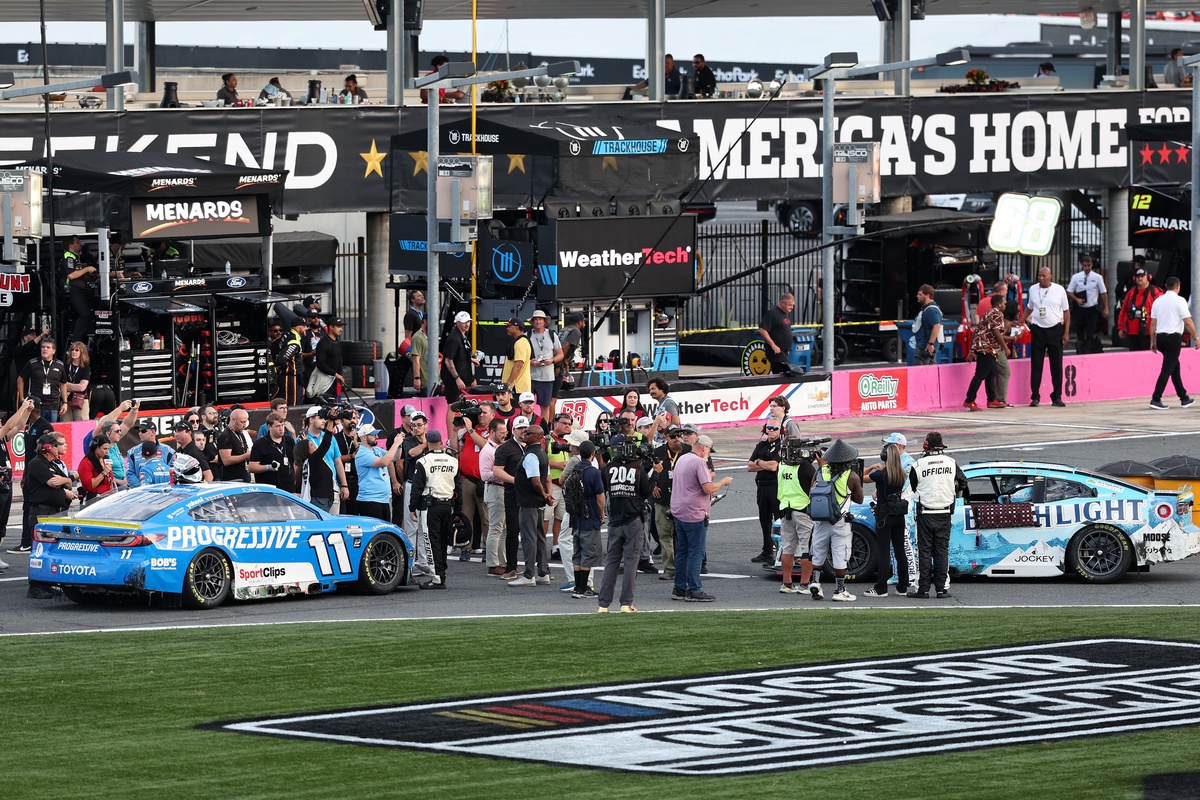
On the final lap during the NASCAR Cup Series race at Charlotte Motor Speedway’s Roval on Sunday, Ross Chastain attempted a dive-bomb on Denny Hamlin to complete a pass that would have secured the point needed to advance in the Playoffs.
That move resulted in both drivers crashing out instead and Joey Logano taking the final Round of 8 spot on points
However, there were a lot of moving parts leading up to that moment too. Chastain held the final spot on points upon taking the white flag. Hamlin passed him before Chastain attempted to move him in the frontstretch chicane.
Prior to that moment, a seemingly faster Cole Custer was behind Logano and was told to conserve tires, which could be interpreted as an order to not pass his fellow Ford Performance stablemate. Similarly, Alex Bowman was told to save tires behind Chastain, and the same interpretation could be applied there.
However, unlike Martinsville last October where Chevrolet teams very clearly over the radio ordered a blockade to protect the points position of William Byron to advance into the final four, this was more subtle.
As a result, NASCAR did not issue any race manipulation penalties. However, with another cutoff race looming at Martinsville in three weeks, the Sanctioning Body will remind teams about protecting the integrity of the racing product this week.
The points were made by NASCAR managing director of communications Mike Forde on Wednesday on the Hauler Talk podcast.
“At a certain point during this week, we will just remind teams, ‘Let’s not put yourselves or ourselves in jeopardy here,’” Forde said. “Fans should be coming to the race track and expecting a straight-up race where each position is fought for as hard as possible, especially at the end of a race.
“If we do see something or hear something we don’t like, we are going to step in, which we’ve have done now several times. So we are aware, and if we hear something, we will certainly react if necessary.”
Also of note, Hamlin climbed out of the car and told crew chief Chris Gayle that ‘I would have not passed him,’ regarding Chastain if he knew the points. In front of the media, Hamlin was more guarded, simply saying ‘I would have made the best decision for me,’ if he had known.
Did any of this come close to a penalty?
“I think we would have looked into it for sure,” Forde said. “If we heard that radio transmission say, ‘Hey, (Chastain) needs this point to advance to the next round over (Logano)’ or something of that ilk, and all of a sudden, (Hamlin) let off the gas, that would probably raise a red flag on our side.”
What about Chastain attempting to crash Hamlin in the first place? NASCAR did not penalize Chastain for the attempt, but Forde left it open-ended when asked if the success of the move would change the decision-making calculus.
“It’s a good question,” Forde said. “Every situation is unique and this is a hypothetical, and there’s some apples to apples and apples and pears or apples and oranges …”
He brought up Austin Dillon crashing both Hamlin and Logano last year at Richmond to make the playoffs – a reward that NASCAR stripped him of.
“The discussion was, if it was successful, we would look at it in race control and hopefully make that decision that evening and quickly,” Forde said of Chastain at the Roval. “We have the off-site remote race control that we talk about; we can pull up data pretty quickly. We can pull up radio transmissions from the team. We would have throttle data traces and steering. And we obviously have the video.
“In that corner, it would be tricky, and this is just my opinion, it would be tricky because that is an aggressive corner to begin with. You only have two more corners, or one more corner, to make a pass and it’s a little bit of a passing zone but not really. Is that an aggressive move to try to make a position when you have no other options or is that over the line? That is a determination we would have to make in race control when that happened. But, in short, the determination we made in the competition debrief is that it was something we would have to look at in real time.”
As for NASCAR warning teams about talking points to their drivers, NASCAR senior director of racing communications Amanda Ellis cleared up what is and isn’t okay.
“It’s not a message of ‘You can’t talk about points,’ it’s more of a message that if you’re talking about points, it should be about your car and your vehicle and not other vehicles that are in play,” Ellis said on the show.
Forde supported that point as well.
“There was no point where this was questionable (or) problematic,” Forde said. “But we wanted to get ahead of it with the teams just to say, ‘Hey, if this is the end of the race and you’re still doing this, it’s not going to be good for anybody. Because if you talk about points and then have some actions that are questionable, you’re going to be in hot water.’“








Read and post comments